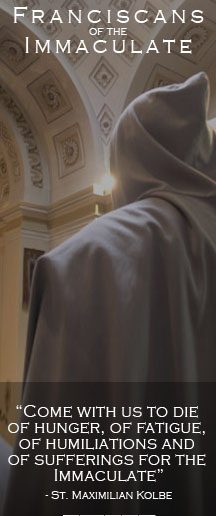Bl. John Paul II called St. Maximilian M. Kolbe “patron of our troubled times.” Today’s world indeed has need of such a Saint so totally the possession of Mary: all hers. Let us imagine for a moment that we are with St. Maximilian and the brothers of Niepokalanów, and that we can ask him questions about the problems of the day, discover his profound understanding of the mysteries of faith and the source of that prudence so evident throughout his holy life and death. The questions which follow are real; and the answers taken from the Saint’s writings are amazingly as fresh and relevant today as when written.
[Numbers in parentheses refer to passages in the published writings of the Saint (in Italian; SK = Scritti Kolbiani) serving as the basis for the Saint’s replies.]
Fr. Maximilian, everywhere today we hear that the times are troubled. How did this ever come about?
“The cause of the causes” of our present crisis is the lack of honesty and the shirking of responsibility. The failure to carry out our fundamental duties to God, to our neighbor and indeed to our very selves is commonplace in life today. This is simply a total lack of genuine love, a substitution of sentiment for the reality of love and a failure to acknowledge it for what it is, an exercise in crass dishonesty. All of us, without exception, must examine our consciences and make a sincere confession and live as authentic Catholics. You would be surprised at the rapidity in the renewal of entire countries to follow on this, the stabilization of their economic-financial order in support of all citizens and families, and their reaffirmation of the dignity of work. At the origin and core of every personal and social misery is sin. In Poland after the First World War we all began to live as lords and ladies. A great multiplication of meetings and a corresponding reduction of work-time to the level of insufficiency; all too frequent theft of public monies and little organization of work became commonplace. The Immaculate must show us the way out of the crisis. She must be present in Parliament, in Congress. Men cannot live for long if they insist on living as though God does not exist, as though Christ the Savior has not come (SK 1119).
It’s commonly said that agnosticism, religious indifference and moral relativism are the dominant modes and models of thought for the man of today…
We should carefully distinguish ordinary folk who seek God in sincerity of heart, who do good, struggle, work and suffer, from those who sow tares and project plans for a society based on rejection of moral values. The problem arises when these “spiritual delinquents” take control of education, of politics, of the media and shape public opinion, all in the name of an emancipation and a freedom indistinguishable from license. Many seek to convince themselves and others that God does not exist, even if they realize that all the scientists put together are incapable of giving life even to a miserable mosquito. Men may well be experts in so many areas of our culture, but as regards the purpose of their life and their relations with God, far from being advanced in philosophy they are behind everyone else. Many persons purchase books adequate to master the empirical sciences. But in regard to the things of God and of the Catholic religion they rely on totally inadequate sources, some suspect, and never do they take in hand that most reliable and clear volume: the Catechism of the Catholic Church (SK 1143).
Do you think we should get used to the triumph of error and of corruption?
No way! Heresy still exists, true enough, but by faith we recognize in the Immaculate her who has destroyed all heresies throughout the world. In our prayers to Mary Most Holy it seems as though this has already taken place. When the cavalry of his enemies made a false maneuver in preparing for battle, Napoleon would shout: “The enemy has lost!” Impenetrable are the ways of divine Providence through the Immaculate who will triumph (SK 1170).
In expecting this triumph how should men of good will dispose themselves?
Perhaps someone on the basis of my preceding observation might come to believe it is sufficient to sit down and relax: in the meantime the Immaculate will see to everything. Great faith in divine intervention in the affairs of men should not be used to excuse ourselves from making a personal commitment to live a Christian life. If we love our neighbors, we must introduce the Immaculate into their hearts, because she can bring them happiness with her truth, her goodness and beauty.
We must begin by opening the doors of our hearts to the Immaculate, allowing her to adorn us with virtue, with ardent love and to purify us from sin. Let us next seek to lead our neighbors to this happy and fruitful discovery by our good example, by good conversation and also—please don’t think I’m taking advantage—by taking out a subscription to Missio Immaculatae International, or by making an offering to assist the missions and the poor. The Immaculate will surely not forget this and we, too, will gain an extra merit (SK 1170). As long as I live I will strive to reach the greatest number of souls in covering the globe with publications about Mary. After the Lord takes me, I hope others will carry on my mission and vocation as persons consecrated to the Immaculate, and some even as Franciscans like me.
Today we hear it said that rather than lead men to God, the maximum is done to conduct them to Hell, even by means of a hatred and fiery persecution of Christians, not excluding attempts to murder them.
Jesus said: “If they have persecuted me, they will persecute you also” (Jn 15: 20). We must not be afraid. There is nothing so beautiful than to give one’s life for one’s friends. Our first “friend” must be Jesus! Would that my ashes might be scattered to the four winds in order to bring Jesus to souls, to bring to them the cause of His Mother and our Mary! I remember when I was a missionary in Japan how I used to walk the way of the Martyrs of Nagasaki. A ten year old Japanese boy, Anthony by name, offered his life out of love for God, invoking the names of Jesus and Mary.
As I recalled that heroic boy when walking on that path, I met two small children. The smallest, only four years old, screamed at me: “Christian Nero, monkey!”
Who taught an innocent child such things? A baby does not understand whether his words are good or bad. But has the person who taught the child to curse Christ reflected well on the moral value of his conduct? Of what is Christ guilty in relation to this child? If there is no reason for cursing Christ, what does such language contribute to the happiness of this child? (SK 1178)
How would you reply to those who claim it is impossible to have respect for Catholicism and that its rules and regulations are too hard?
When we want to realize any project, we must necessarily give up everything contrary to that goal and use whatever advances its realization. Any other approach is doomed to failure. Experience shows that we appreciate more what we achieve with a great deal of effort rather than what is gained too easily. Were we to gain eternal salvation without any difficulties, we would not be able to enjoy it as much as when we must gain it by continuous work.
St. Francis gave up his palatial birthplace to embrace voluntary poverty. St. Teresa of Avila said: “Either suffer or die.” She considered an existence without suffering for love of God void of meaning. Contemplate what strength and interior consolation God offers those who, out of love for Him, do not hesitate to walk in the footsteps of Christ crucified and to crucify their natural inclinations by observing the prescriptions of His holy religion. Jesus expressly teaches that “His yoke is sweet and His burden light” (Mt 11: 30), thus encouraging timid souls to yoke themselves to Him and to bear the burden of His religion.

